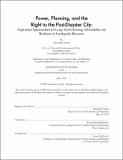Power, planning, and the right to the post-disaster city : exploring opportunities for long-term housing affordability and resilience in earthquake recovery
Author(s)
Acuña, Alexander(Alexander Richard Louis)
Download1139523219-MIT.pdf (4.934Mb)
Alternative title
Exploring opportunities for long-term housing affordability and resilience in earthquake recovery
Other Contributors
Massachusetts Institute of Technology. Department of Urban Studies and Planning.
Advisor
Devin Michelle Bunten.
Terms of use
Metadata
Show full item recordAbstract
The San Francisco Bay Area is in the midst of a housing crisis, which has been exacerbated by the growth of high-income earners, slow housing construction, and a historic transfer of property ownership facilitated by the foreclosure crisis. This has resulted in the rapid displacement of low- and moderate-income communities, particularly those of color. The displacement of these communities is set to accelerate with "the Big One," an inevitable massive earthquake expected to hit California. Investments in hazard mitigation and disaster response will help to lessen impact, but the reality is that large-scale disasters will cause devastation, especially on low-income communities of color, no matter how much preparation. Knowing that natural disasters are increasing, and that central cities will move to rebuild, what opportunities do disasters present to reshape the post-disaster city of the future, and where do these opportunities create space to advance affordable housing? Through the theories of the "Right to the City" and the "Shock Doctrine," I explore the political, spatial, and economic opportunities that disasters create within the housing market, the tensions in recovery, and the power dynamics that determine who benefits from disaster resilience. By creating a "blank canvas" on which to develop new uses, facilitating changes in land ownership, and drawing on an influx of institutional funding for development projects, disasters can be catalysts for reshaping the city. I introduce the community land trust (CLT) model as a strategy uniquely suited to use these opportunities to address displacement and encourage wealth building, both today and in post-disaster scenarios. Using cases from CLTs in Houston and the Florida Keys, I examine the opportunities and challenges of CLT post-disaster expansion. I conclude by recommending planning processes for Bay Area cities and communities to pursue in preparation for advancing the right to the post-disaster city.
Description
This electronic version was submitted by the student author. The certified thesis is available in the Institute Archives and Special Collections. Thesis: M.C.P., Massachusetts Institute of Technology, Department of Urban Studies and Planning, 2019 Cataloged from student-submitted PDF version of thesis. Includes bibliographical references (pages 61-67).
Date issued
2019Department
Massachusetts Institute of Technology. Department of Urban Studies and PlanningPublisher
Massachusetts Institute of Technology
Keywords
Urban Studies and Planning.